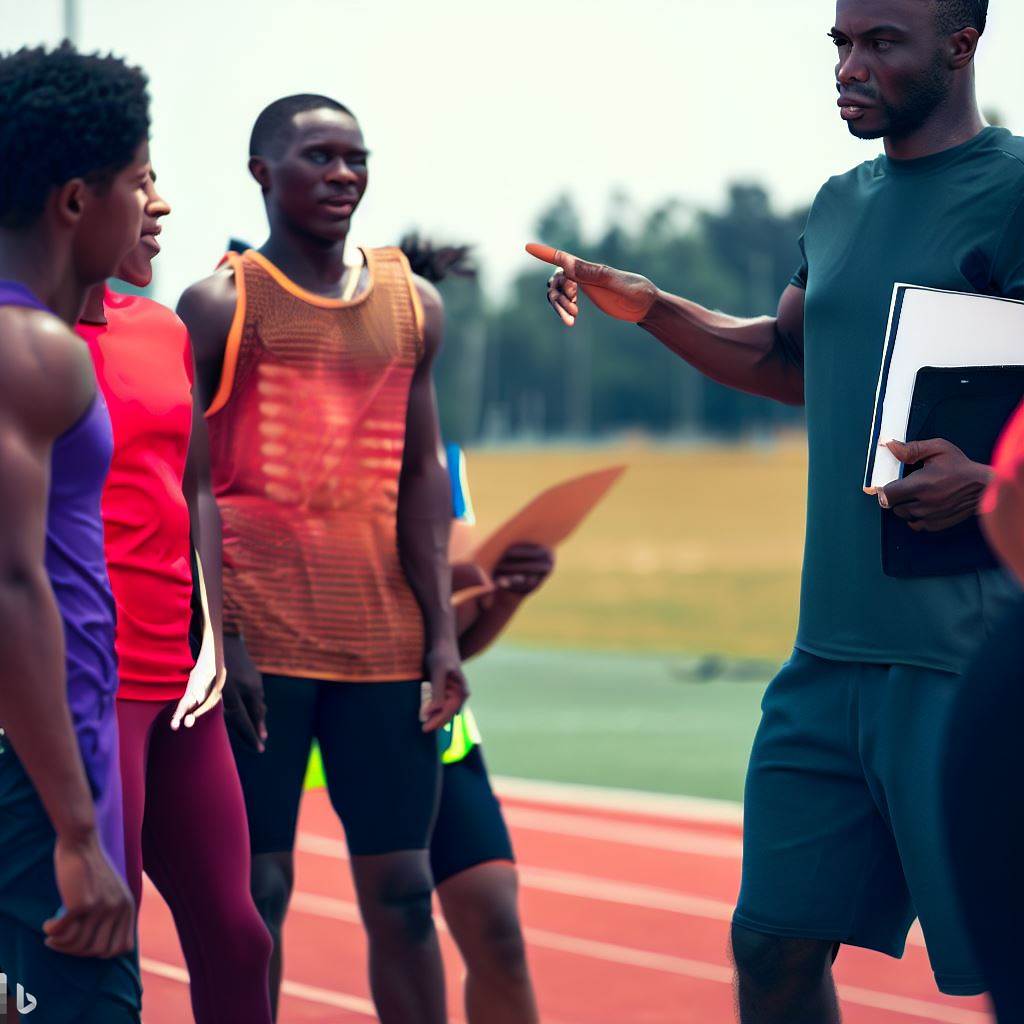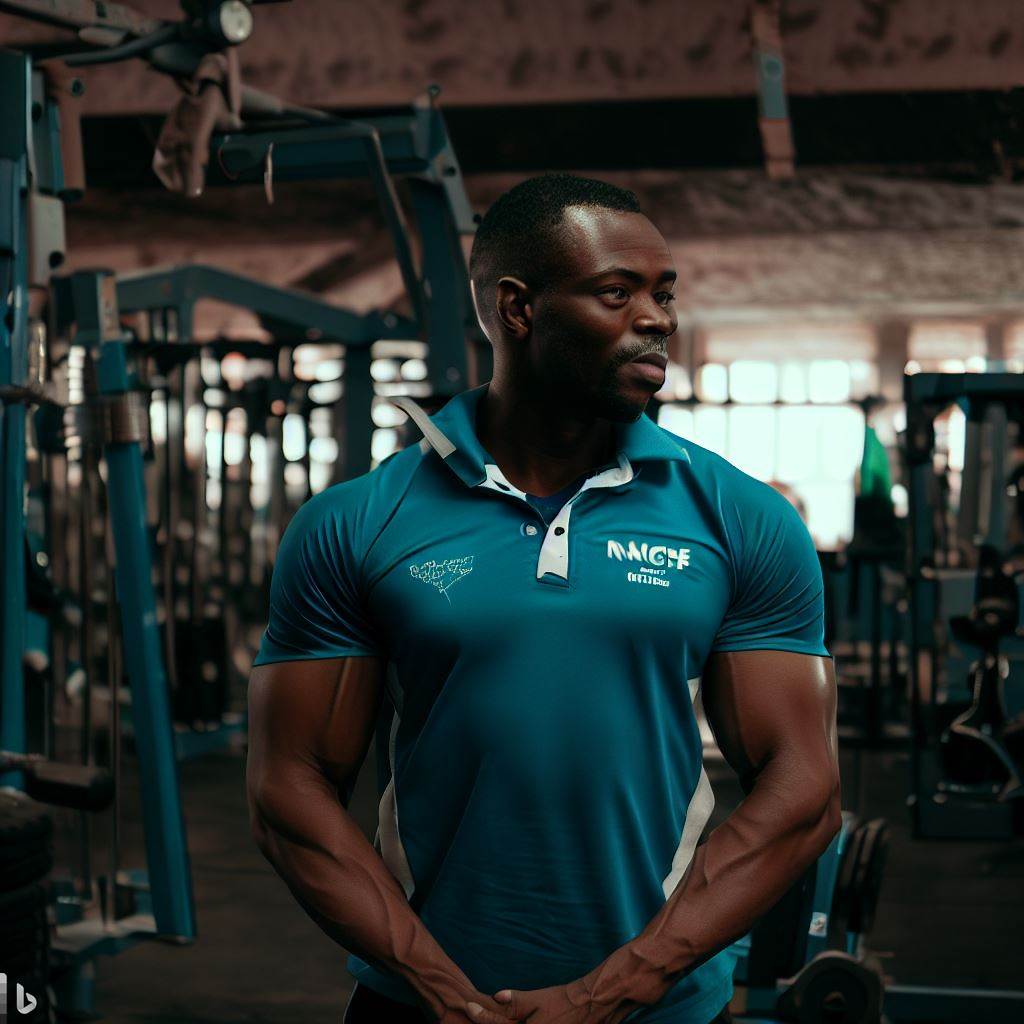Introduction
Meet the Nigerian Athletic Director, the unsung hero behind Nigeria’s burgeoning athletics scene.
As athletics gains immense popularity in Nigeria, understanding the daily responsibilities of these dedicated directors is crucial.
Intricately woven into the fabric of Nigerian sports, Athletic Directors play multifaceted roles that shape the nation’s sporting landscape.
They are the architects of athletic programs, fostering talent, and nurturing the dreams of future champions.
Their tasks encompass a myriad of responsibilities, from managing facilities, budgets, and coaching staff to overseeing athlete development and compliance.
To comprehend the relentless dedication, passion, and commitment of these directors, we delve into a day in their life.
Join us on this enlightening journey as we uncover the intricacies and challenges faced by Nigerian Athletic Directors, offering a glimpse into the dynamic world that propels Nigerian athletics forward.
Overview of the Role
Being an Athletic Director is a demanding and rewarding position within the realm of sports management.
Athletic Directors play a vital role in overseeing and coordinating the athletic programs in schools and universities.
One of the key responsibilities of an Athletic Director is to hire and supervise coaches and staff members.
Moreover, Athletic Directors must evaluate the performance of coaches and provide them with the necessary support and guidance to enhance their skills.
In addition to managing personnel, Athletic Directors oversee the budget for the athletic department.
They are responsible for allocating funds to various sports programs, ensuring that resources are distributed fairly and used efficiently.
This requires financial planning, monitoring expenditures, and making decisions that prioritize the needs of different sports teams.
They should work towards ensuring equal opportunities for athletes from different backgrounds and underrepresented groups.
This involves implementing policies that prevent discrimination and creating an inclusive environment that celebrates diversity in sports.
Nigerian Athletic Directors face specific challenges that require their resilience and adaptability.
Limited resources, inadequate facilities, and financial constraints are common obstacles they encounter.
They must find innovative solutions to overcome these challenges and provide student-athletes with the best possible opportunities for their growth and development.
Another challenge faced by Nigerian Athletic Directors is the need to strike a balance between academic and athletic commitments.
In Nigeria, academics are often prioritized over sports, making it essential for Athletic Directors to advocate for the importance of a well-rounded education that includes athletic participation.
Furthermore, Nigerian Athletic Directors must also navigate cultural expectations and attitudes towards sports.
In review, the role of an Athletic Director is multifaceted, involving responsibilities such as leadership, management, budgeting, promotion, and fostering inclusivity.
Read: Navigating Regulations as an Athletic Director in Nigeria
Morning Routine
The start of the day for a Nigerian Athletic Director is filled with various tasks and responsibilities that set the tone for the rest of their day.
They begin their mornings with a well-planned routine, ensuring that everything is organized and ready for the day ahead.
A. Daily Planning and Administrative Tasks
- Review and prioritize daily tasks, including scheduling meetings and events.
- Check emails and respond to any urgent messages or inquiries.
- Coordinate with the administrative staff to ensure smooth operations and efficient communication.
- Review budgetary requirements and allocate funds for various athletic programs and initiatives.
- Prepare reports and documentation for senior management and board meetings.
As an Athletic Director, it is crucial to have exceptional organizational and multitasking skills to handle the daily administrative workload efficiently.
B. Interactions with Coaches, Athletes, and Staff Members
One of the essential aspects of an Athletic Director’s role is maintaining strong relationships with coaches, athletes, and staff members.
They collaborate closely to ensure the success and well-being of the athletic programs.
- Meet with coaches regularly to discuss training plans, strategy, and performance evaluations.
- Provide guidance and support to coaches regarding team management and athlete development.
- Engage with athletes to address their concerns, motivate them, and monitor their progress.
- Collaborate with the sports medicine staff to ensure athletes’ health and injury prevention.
- Work closely with the academic support team to monitor student-athletes’ academic progress.
- Conduct staff meetings to discuss administrative updates, policies, and any challenges faced.
These interactions allow the Athletic Director to foster a positive and inclusive athletic environment, promoting teamwork and dedication.
C. Overall Morning Routine
Mornings can be bustling for a Nigerian Athletic Director, juggling various responsibilities and ensuring smooth operations within the athletic department.
They wake up early, ready to tackle the day ahead.
After a refreshing shower and a healthy breakfast, they dive into their routine, starting with reviewing the day’s schedule and prioritizing tasks.
Once the administrative tasks are taken care of, they engage in meetings and interactions with coaches, athletes, and staff members.
These conversations involve brainstorming sessions, addressing concerns, strategizing, and fostering a collaborative atmosphere.
The morning routine of a Nigerian Athletic Director sets the foundation for a productive and successful day, ensuring that all aspects of the athletic department are well-managed and aligned towards achieving the institution’s athletic goals.
As the morning routine comes to an end, the Athletic Director moves on to the next phase of their day, ready to face new challenges and continue their dedicated commitment towards the growth and success of Nigerian sports.
Read: Work-Life Balance: Coaching in Nigeria Explored
Management of Athletic Programs
A. Responsibilities in Managing Various Sports Programs
As an athletic director, my main responsibility is to oversee all the sports programs. I am in charge of developing the athletic department’s mission, goals, and objectives.
One of my duties is to create and implement policies and procedures for the sports programs.
I am responsible for hiring and supervising the coaches and athletic staff for each sport. I ensure that all athletes and coaches comply with the school’s rules and regulations.
B. Process of Selecting Teams and Coordinating Events
One of the crucial tasks is selecting athletes for the various sports teams. I assess the skills and abilities of the students through tryouts, evaluations, and recommendations.
Once the teams are selected, I schedule and coordinate practices, games, and tournaments.
I collaborate with other schools and sports organizations to plan and organize competitive events.
Throughout the season, I monitor the progress of each team and provide necessary support and guidance.
C. Importance of Budget Management and Fundraising Efforts
Managing the budget is a vital aspect of overseeing athletic programs.
I am responsible for allocating funds for equipment, uniforms, travel expenses, and facility maintenance.
To ensure sufficient funding, I actively participate in fundraising efforts and seek sponsorships.
I organize fundraising events such as athletic banquets, marathons, and community outreach programs.
The success of these efforts directly impacts the quality and sustainability of the sports programs.
By effectively managing all aspects of athletic programs, I strive to create a positive and successful environment for the student-athletes.
I believe that through proper organization, coordination, and financial management, we can develop well-rounded individuals both on and off the field.
As an athletic director, it is my duty to ensure that every athlete has equal opportunities to excel and grow in their chosen sports.
I am committed to fostering teamwork, discipline, sportsmanship, and a sense of responsibility in all our athletes.
With a well-managed and thriving athletic program, our school can proudly represent itself in competitions and produce outstanding athletes.
I am dedicated to the continuous improvement and success of our sports programs, and I am grateful for the opportunity to make a difference in the lives of our student-athletes.
Read: Fitness Trends: Nigeria’s Strength Coaching Scene
Interactions with Stakeholders
Interactions with stakeholders are a vital part of a Nigerian Athletic Director’s role.
Effective communication and problem-solving skills play a crucial role in maintaining relationships with school administrators, coaches, and parents.
Athletic Directors have a symbiotic relationship with school administrators. They work hand in hand to ensure the smooth operation of the athletic program.
The relationship between Athletic Directors and coaches is built on trust and collaboration.
Parents are another important stakeholder group that Athletic Directors interact with.
- Effective communication is key in building and maintaining relationships with stakeholders.
- Clear and frequent communication channels ensure everyone is on the same page.
- Athletic Directors act as intermediaries between various stakeholder groups, facilitating dialogue and understanding.
Athletic Directors play a vital role in addressing the concerns of athletes and parents.
They act as advocates for student-athletes, ensuring their well-being, safety, and commitment to academic success.
Directors establish protocols for addressing complaints, conflicts, or other issues that arise within the athletic program.
Creating a culture of transparency and trust is essential for an Athletic Director.
By providing accessible avenues for feedback and actively seeking input from stakeholders, directors can foster an environment where concerns are addressed promptly and fairly.
- Regular meetings with athletes provide a platform to address concerns and ensure their voices are heard.
- Athletic Directors collaborate with parents to understand their expectations and address any issues or frustrations.
- Directors work towards creating an inclusive and supportive environment for all student-athletes.
In essence, interactions with stakeholders are a significant aspect of a Nigerian Athletic Director’s role.
Effective communication, problem-solving skills, and addressing concerns are crucial in building strong relationships with school administrators, coaches, and parents.
By fostering collaboration and ensuring transparency, Athletic Directors can create a positive and fulfilling environment for all involved.
Read: Athletic Directors: Nigeria’s Sports Development Leaders

Future Planning and Development
In order to ensure long-term success and growth, Nigerian Athletic Directors have clear goals and visions for the future.
- Setting Goals: Athletic Directors aim to develop and implement strategic plans that outline their vision for Nigerian athletics. These goals may include increasing participation rates, improving performance levels, and enhancing the overall athletic program.
- Improving Facilities: One key aspect of future planning is upgrading and expanding athletic facilities. This involves constructing state-of-the-art stadiums, gyms, and training centers to provide athletes with top-notch training environments.
- Upgrading Equipment: Another important consideration is investing in modern and high-quality equipment. This includes purchasing new sports gears, training materials, and technology to aid athletes in their development and performance.
- Enhancing Training Programs: Nigerian Athletic Directors strive to create effective training programs that cater to the specific needs of athletes. This involves hiring qualified coaches, implementing specialized training regimens, and providing access to sports science services.
- Talent Identification: Future planning also entails identifying and nurturing young talents. Athletic Directors collaborate with schools, communities, and talent scouts to identify potential athletes and provide them with opportunities for growth and development.
- Scholarship Opportunities: Athletic Directors work towards increasing the availability of scholarships for talented athletes. This not only helps athletes pursue their dreams but also ensures a pipeline of skilled athletes for the country’s sports teams.
- Strengthening Relationships: Nigerian Athletic Directors understand the importance of building strong relationships with other stakeholders. This includes fostering partnerships with corporate sponsors, sports federations, and government bodies to secure funding, resources, and support.
By focusing on these future plans and development strategies, Nigerian Athletic Directors are determined to take Nigerian athletics to new heights.
With a clear vision in mind and a commitment to continuous improvement, the future of Nigerian sports looks promising.
Challenges and Rewards
In the fast-paced world of Nigerian athletic directors, challenges abound.
These dedicated individuals face a multitude of obstacles daily, but the rewards and personal fulfillment gained from their role make it all worthwhile.
A. Challenges Faced by Nigerian Athletic Directors
- Funding: One significant challenge Nigerian athletic directors face is securing adequate funding for their programs.
- Limited Resources: Another obstacle is the lack of resources, such as equipment and facilities, which can hinder the development of athletes.
- Infrastructure: Poor infrastructure poses a challenge as it affects transportation and logistics, making it difficult for athletes to compete in national and international events.
- Competition: Nigerian athletic directors must navigate fierce competition from other sports and entertainment industries, making it harder to attract and retain talented athletes.
- Lack of Support: Sometimes, athletic directors face resistance and lack of support from school administrations, parents, and even the community.
- Administrative Burden: Managing administrative tasks, paperwork, and bureaucratic procedures requires significant time and effort.
- Adapting to Change: Constantly evolving rules and regulations in international sports associations pose a challenge for athletic directors.
- Maintaining Standards: Ensuring fair play, ethics, and sportsmanship throughout the athletic programs can be a daunting task.
- Security Concerns: Nigerian athletic directors must address security concerns that affect athletes’ safety during events and training sessions.
B. Rewards and Personal Fulfillment
Despite these challenges, the rewards and personal fulfillment that come with being a Nigerian athletic director are immense.
Here are the main rewards:
- Student Athlete’s Success: Witnessing the personal growth and achievements of student athletes is deeply fulfilling.
- Life-Changing Impact: Athletic directors have the power to positively impact the lives of young athletes, guiding them towards a successful future.
- Building a Legacy: Creating a successful athletic program and leaving a lasting impact on generations of athletes is a source of immense pride.
- Cultural Exchange: Interacting with athletes from different backgrounds provides opportunities to promote cultural exchange and understanding.
- Mentorship and Coaching: Athletic directors have the chance to mentor and coach athletes, helping them develop crucial life skills beyond the sports arena.
- Collaboration and Networking: Building connections with other athletic directors and professionals in the sports industry can lead to valuable partnerships and opportunities.
- Contributing to National Pride: Developing successful athletic programs contributes to the pride and recognition of Nigeria on the global sports stage.
- Personal Growth: Overcoming challenges and constantly learning in a dynamic field fosters personal growth and professional development.
C. Success Stories and Achievements
Nigerian athletic programs have achieved remarkable success over the years.
Here are some inspiring examples:
- Olympic Victories: Nigerian athletes have secured multiple medals in various Olympic sports, showcasing their immense talent and dedication.
- Indigenous Sports Development: Athletic directors have played a crucial role in reviving and promoting indigenous sports, preserving Nigeria’s cultural heritage.
- University Scholarships: Talented student athletes have earned scholarships to prestigious universities worldwide, furthering their education and athletic careers.
- Community Integration: Successful athletic programs have brought communities together, fostering pride and unity.
- International Recognition: Nigerian athletes have achieved significant recognition and respect on the global sports stage, elevating the country’s reputation.
- Professional Success: Several Nigerian athletes have gone on to excel in professional sports leagues, becoming role models for aspiring athletes.
- Social Impact: Athletic programs have provided opportunities for underprivileged youth, offering a path to success beyond their circumstances.
In general, Nigerian athletic directors face numerous challenges in their roles, but the rewards and personal fulfillment are substantial.
Their dedication, resilience, and passion for sports contribute to the success stories and achievements of Nigerian athletic programs.
Conclusion
Throughout this article, we have highlighted the demanding and fulfilling role of a Nigerian Athletic Director.
We have seen a day in their life, from overseeing sports programs to managing facilities.
Nigerian Athletic Directors play a crucial role in the development and success of athletes in Nigeria.
They provide guidance, support, and resources to help athletes excel both on and off the field.
As we conclude, it is important to acknowledge and appreciate the hard work and dedication of Athletic Directors in Nigeria.
Their tireless efforts contribute to the growth of sports and the nurturing of talented athletes.
We encourage readers to actively support and appreciate the work of Nigerian Athletic Directors.
Whether it’s attending games, volunteering, or providing resources, every effort counts in creating a thriving sports culture in Nigeria.
Let us come together and celebrate the invaluable contribution of Athletic Directors in shaping the future of Nigerian sports.




